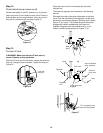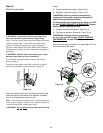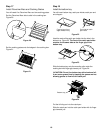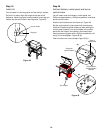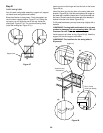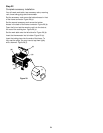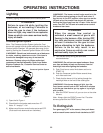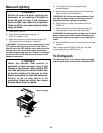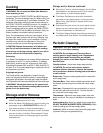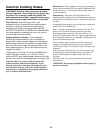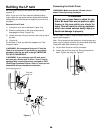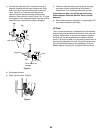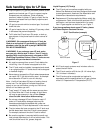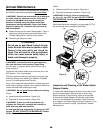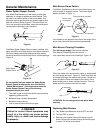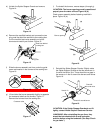Special offers from our partners!

Find Replacement BBQ Parts for 20,308 Models. Repair your BBQ today.

Buy Weber Grill Parts. It couldn't be easier. Find your Weber parts here.

24
Cooking
ƽWARNING: Do not move the Weber Gas Barbecue
when operating or hot.
You can adjust the FRONT, CENTER and BACK burners
as desired. The control settings High (H), Medium (M), Low
(L), or Off (O) are described in your Weber cookbook. The
cookbook uses these notations to describe the settings of
the FRONT, CENTER, and BACK burners. For example, to
sear steaks you would use (HHH) (all burners at high).
Then to complete cooking you would use (MOM) (FRONT
at medium, CENTER off, and BACK at medium). See your
Weber cookbook for detailed cooking instructions.
Note: The temperatures inside your cooking box, for the
first few uses, while surfaces are still very reflective, may
be hotter than those shown in your cookbook. Cooking
conditions may require the adjustment of the burner
controls to attain the correct cooking temperatures.
ƽCAUTION: Replace thermometer in lid when not in
use. Do not leave thermometer in food while cooking.
If burners go out during cooking, open lid, turn off all
burners and wait 5 minutes before relighting.
Preheating
Your Weber Gas Barbecue is an energy efficient appliance.
It operates at a low B.T.U. rate for economy. To preheat,
after lighting, close lid and turn all burners to high (HHH).
Preheating to between 500° and 550° F (260° and 290° C)
will take 10 to 15 minutes depending on conditions such as
air temperature and wind.
Drippings and grease
The Flavorizer Bars are designed to "smoke" the right
amount of drippings for flavorful cooking. Excess drippings
and grease accumulate in the catch pan under the bottom
tray. Disposable foil liners are available that fit the catch pan.
ƽWARNING: Check the bottom tray for grease build-
up before each use. Remove excess grease to avoid a
grease fire in the bottom tray.
Periodic Cleaning
ƽWARNING: Turn your Weber Gas Barbecue OFF and
wait for it to cool before cleaning.
ƽCAUTION: Do not clean your Flavorizer Bars or
cooking grates in a self-cleaning oven. Replacement
cooking grates and Flavorizer Bars are available
through your retailer or the Weber-Stephen Products
Service Center.
Outside surfaces - Use a warm soapy water solution.
ƽCAUTION: Do not use oven cleaner, abrasive
cleansers (kitchen cleansers), cleaners that contain
citrus products or abrasive cleaning pads on barbecue
or cart surfaces.
Bottom tray - Remove excess grease and then wash with
warm soapy water.
Flavorizer Bars - Clean with a suitable brass bristle brush.
As needed, remove from grill and wash with warm soapy
water.
Catch pan - Disposable foil trays are available, or you can
line the catch pan with aluminum foil. To clean the catch
pan, wash with warm soapy water.
Thermometer - Wipe with warm soapy water, clean with
plastic scrub ball. Do not put in dishwasher or submerge in
water.
Inside cooking box - Brush any debris off of burners tubes.
DO NOT ENLARGE BURNER PORTS (OPENINGS). Wash
inside of cooking box with warm soapy water.
Inside Lid - While lid is warm, wipe inside with paper towel
to prevent flaking due to grease build-up.
Storage and/or Nonuse
■ The gas must be turned off at the LP tank when the
Weber Gas Barbecue is not in use.
■ When the Weber Gas Barbecue is stored indoors, the
gas supply must be DISCONNECTED and the LP
tank stored outdoors in a well-ventilated space.
■ LP tanks must be stored outdoors in a well- ventilated
area out of reach of children. Disconnected LP tanks
must not be stored in a building, garage or any other
enclosed area.
Storage and/or Nonuse continued
■ When the LP tank is not disconnected from the Weber
Gas Barbecue, the appliance and LP tank must be
kept outdoors in a well-ventilated space.
■ The Weber Gas Barbecue should be checked for
gas leaks and any obstructions in the burner tubes
before using. (See Sections "General and Annual
Maintenance.")
■ Check that the areas under the control panel and the
bottom tray are free from debris that might obstruct
the flow of combustion or ventilation air.
■ The Spider Stopper Guards should also be checked for
any obstructions. (See Section "Annual Maintenance.")



